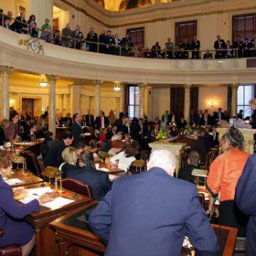Measure Would Create Tax Credit Incentive for Retained and New Jobs
TRENTON – A bipartisan bill sponsored by Senator Raymond J. Lesniak which would create the “Grow New Jersey” program to provide tax incentives for New Jersey-based companies which maintain existing employment levels and create new jobs was approved by the Senate Economic Growth Committee today by a vote of 7-0.
“With New Jersey’s unemployment rate at over 9 percent and capital investment in the State stagnating, we have to encourage employers to put New Jerseyans back to work,” said Senator Lesniak, D-Union, and the Chairman of the Senate Economic Growth Committee. “This bill would create a tax credit program, similar to the successful BEIP (Business Employment Incentive Program) and BRRAG (Business Retention and Relocation Grant) programs, in order to specifically encourage businesses to stay in New Jersey and expand our workforce. I’m confident that the ‘Grow New Jersey’ program will be another tool to help incentivize businesses to invest in the Garden State.”
The bill, S-3033, would establish the $200 million “Grow New Jersey” tax credit business incentive program to stimulate economic investment and private job creation. Under the bill, businesses in qualifying development zones would be eligible for the tax credits if they make or acquire a capital investment of at least $20 million, and employ at least 100 full-time employees. Beyond the employment and investment eligibility standards, the business’s CEO would be required to certify that any retained jobs are at risk of leaving the State and that at least 50 percent of the jobs at the project are New Jersey-based at the time of application. Finally, the business would have to demonstrate to the New Jersey Economic Development Authority (EDA) that the tax credit, balanced against the new or retained jobs and capital investment, will yield a net positive benefit for the State.
Qualifying businesses would be able to receive a base tax credit of $5,000 per job, per year, for 10 years on the amount of Corporate Business Taxes owed. The State EDA could increase the amount to $8,000 per job if the following conditions are met:
• the business is an in industry marked by the EDA as desirable for the State to maintain;
• the business relocates to a location adjacent to a public transit facility;
• the project creates jobs using full-time employees whose annual salaries, according to the Department of Labor and Workforce Development, are greater than the salary of the average worker employed in the State; and
• the business has been negatively impacted by the approval of a “qualified business facility,” under the Urban Transit Hub Tax Credit.
The per project tax benefit would not be permitted to exceed the capital investment at the project site, according to Senator Lesniak. He added that the EDA would have the authority to increase the amount of the program, from $200 million to up to $1.5 billion, if the agency determines that additional tax credits are reasonable, justifiable and appropriate. Finally, the EDA would be able to recapture the amount of the tax credit issued if a business does not meet an 80 percent job retention standard, stays in-State for less than 15 years, employs less than 100 people at the location, or the business is sold or subleases its tenancy in whole or in part to another corporate entity.
“The program puts a premium on high-paying, highly skilled jobs, and will encourage businesses to reclaim deserted properties, like the Shering-Plough Labs facilities in Union,” said Senator Lesniak. “At the end of the day, this is the sort of investment that will yield results for people who have been struggling in the current economic crisis.”
The bill now heads to the Senate Budget and Appropriations Committee, where it is scheduled for a hearing Thursday. If approved there, the bill would go on to the full Senate for consideration.



